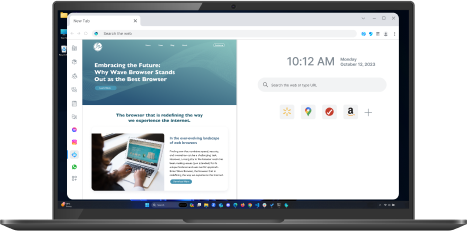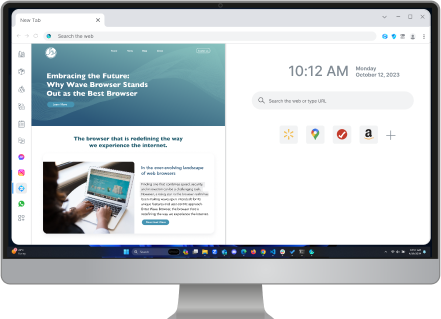5 Tips to Make Web Browsing Even Faster
Table of Contents

Tired of slow-loading pages, laggy tabs, or delayed video playback? Whether you're streaming, gaming, researching, or just scrolling, a faster browsing experience can save you time and frustration.
From smart browser settings and extensions to browser choice and system tweaks, these 30 tips will help you speed things up and make your web browsing smoother, snappier, and way more enjoyable—no matter what device you’re using.
What Factors Affect Browser Speed?
The main factors that affect browser speed include RAM usage, CPU optimization, disk space, browsing data, browser extensions, and inactive tabs. These factors can all greatly affect web page load times in milliseconds.
Speed Across Different Internet Connections
From Wi-Fi to broadband and mobile data, it’s important to understand the unique characteristics and implications for our internet speed and stability on each of these.
Wi-Fi Connections: Best for Remote Work

- Speed and Reliability: A good Wi-Fi connection can provide a stable and high-speed internet experience, but is typically to the vicinity of the router, which means users may experience slower speeds or signal loss as they move farther from the source.
Broadband Connections: Best for Demanding Tasks

- High-Speed Internet: Broadband connections include DSL, cable, and fiber-optic. These offer some of the fastest internet browser speeds available and are best for bandwidth-intensive tasks like streaming, online gaming, and large downloads.
- Wired Connections: Broadband connections are wired and offer a stable and consistent internet experience.
Mobile Data Connections: Best for Being on the Go

- Portability: Mobile data connections from your iPhone or Android browser are highly portable, allowing users to access the internet on the go. However, they tend to have higher latency compared to wired connections.
- Speed Variation: Mobile data speeds can vary depending on network coverage, signal strength, and the number of users on the network.
How to Make Browser Faster
If you regularly look up "how to make browser faster", here are universal tips to give you the super fast browser you're looking for regardless of your operating system, whether it's Mac, Windows devices like Windows 10, Linux, iOS, or Chrome OS.
1. Close unused browser tabs
Each open tab consumes memory and processing power. Close tabs you're not actively using to free up system resources.
2. Keep Your Browser Updated
Ensure that you're using the latest version of your web browser for performance improvements, bug fixes, and security enhancements.
3. Clear Browsing Data, Cache and Cookies
Periodically clear browsing data, such as your browser's cache and cookies. Cached data can accumulate and slow down your browsing experience over time.
4. Manage Apps, Extensions, and Add-ons
Review your installed extensions or add-ons. Disable or remove any that you don't regularly use, as they can consume your computer's RAM or memory and CPU resources, slowing your computer down. You can also use caret browsing for a more accessible browsing experience.
5. Scan for Malware
Removing malware is one quick way to make browser faster. Regularly scan your computer for malware, viruses, and other online threats, as these can slow down your browser and overall system performance. Security fixes to prevent malware infections include installing antivirus software that regularly scans your computer and alerts you if you need to take action.
How to Make Wave Browser Faster

If you're a Wave Browser user looking to boost speed and performance, there are a few easy tweaks to make it one of the fastest browsers around.
First, enable Memory Saver Mode to free up system resources by pausing inactive tabs. Make sure you're always running the latest version of Wave Browser to benefit from new features and performance fixes. Take a moment to manage your extensions—removing ones you rarely use (like a QR code scanner you never touch) can reduce memory usage and speed things up.
Lastly, turn on Wave’s built-in ad blocker and adjust your content-blocking settings to block ads and trackers, which not only improves load times but also protects your privacy while you browse.
How to Make Chrome Faster for Google Users

If you're one of Google Chrome's vast user base and looking to make browser faster. Here's how to make Chrome browser faster:
1. Use the new version of Chrome
Learn if you need to update your Google Chrome your browser by following the steps below:
- Launch Chrome.
- Click on the More menu icon (represented by three vertical dots).
- Navigate to Help and select About Google Chrome.
If you need to update Google Chrome, an update is needed, Chrome will automatically begin the installation of the latest browser version and prompt you to restart and reset Chrome browser.
Click on Relaunch to reset Chrome and complete the process.
2. Remove Unused Chrome Extensions
To remove extensions in Google Chrome:
- Open Chrome.
- Click the three vertical dots in the top-right corner.
- Go to Extensions > Manage Extensions
- Find the extension to remove and click Remove.
- Confirm the removal.
How to Make a Chromebook Faster

If you're interested in learning how to make Chromebook faster, we've got you covered.
- Update Chrome OS: Ensure that your Chromebook is running the latest version of Chrome OS. Go to Settings > About Chrome OS > Check for updates, and install any available updates.
- Enable Hardware Acceleration: In Chrome settings, go to Advanced > System and ensure that Use hardware acceleration when available is turned on. This can speed up performance, especially for tasks involving graphics.
- Manage Downloads and Files: Keep your Downloads folder and Google Drive organized. Excessive files can slow down your device.
- Powerwash (Factory Reset): As a last resort, you can perform a Powerwash, which allows you to reset browser settings for your Chromebook. This will remove all data, so back up your important files first.
How to Make Firefox Faster

If you are a Mozilla Firefox user looking to make browser faster, here's how to make Firefox faster:
1. Extensions and Add-ons
Having too many extensions and add-ons can significantly slow your computer down. Even a free fast browser has it’s limits. Disable or remove unnecessary ones by going to Menu > Add-ons and Themes.
2. Enable Hardware Acceleration
Hardware acceleration is a technology that offloads certain tasks from a computer's CPU to its graphics processing unit (GPU) for faster and more efficient performance. Here's how to enable it:
- Open Firefox settings by typing about:preferences in the address bar.
- Scroll down to the Performance section.
- Check the box that says Use recommended performance settings.
- Ensure Use hardware acceleration when available is checked.
3. Reduce Content Process Limit
Reducing the content process limit in a web browser can speed up a computer by conserving memory and CPU resources, as it limits the number of separate processes the browser uses to render web pages and run extensions. Here's how to set this up:
- Type about: config in the address bar and accept the warning.
- Search for dom.ipc.processCount and reduce the number to a lower value (e.g., 4). This can save memory at the expense of some performance.
4. Enable Tracking Protection
Not only does this block more trackers, it improves privacy and speed. Here's how to do it:
- Go to Menu > Options > Privacy & Security.
- Under the Enhanced Tracking Protection section, choose Strict.
5. Monitor Memory Usage
Check Firefox's memory usage using the Task Manager (Shift+Esc). You can identify and close tabs or extensions that consume excessive memory through the Task Manager.
How to Make Microsoft Edge or Internet Explorer Faster

If you're using Microsoft Edge browser or IE and want to make browser faster, here are a few tips specific to this browser:
1. Enable Hardware Acceleration
In the browser settings, go to System and ensure that Use hardware acceleration when available is turned on. This can offload some tasks to your GPU, improving performance.
2. Turn on Predictive Page Loading
In the settings, go to Privacy, search, and services and turn off Use page prediction to speed up browsing, improve reading, and make my overall experience better.
3. Use the Sleeping Tabs Feature
Microsoft Edge has a Sleeping Tabs feature that can help reduce resource usage for inactive tabs. Enable it in the settings.
4. Customize Content Blocking
Adjust your content blocking settings in the privacy settings to block unwanted content like ads and trackers, which can speed up page loading.
5. Enable SmartScreen
Ensure SmartScreen is enabled in the security settings. It helps protect against malicious websites and phishing attempts, which can impact browser speed.
Pro-tip: Internet Explorer is very outdated. Even Microsoft recommends a move to Edge.
How to Make Opera GX Faster

Here's how to make browser faster on Opera GX:
- Utilize GX Control: Take advantage of Opera GX's built-in feature called GX Control. It allows you to allocate CPU and RAM resources to the browser, ensuring it runs smoothly alongside your games and other applications.
- Limit Background Processes: Go to the Opera GX settings and under the Advanced section, limit the number of processes running in the background. This can help conserve system resources.
- Manage Tabs Efficiently: Close unused tabs to free up memory and processing power. Consider using the built-in Tab Hibernation feature to further reduce resource usage.
- Disable VPN When Not in Use: If you're not actively using the built-in VPN, consider disabling it. This can help conserve bandwidth and potentially speed up your browsing experience.
We simply cannot get by without a fast internet connection these days. These tips for how to make browser faster work across any browser of your choice including Wave Browser, Google Chrome, Mozilla Firefox, Opera Browser or Opera GX, Brave Browser, and Microsoft Edge.
From hardware acceleration to extensions management, these tips ensure swift browsing, whether you're a remote worker looking for stable load speeds or an internet gamer looking to maximize your FPS.
Wave Browser excels with its remarkable speed and efficiency. So, optimize your browser to make it the best web browser, enjoy quicker web surfing, and embrace a smoother online journey. Download Wave Browser today and experience the fastest web browser!
Surf with Ease, Speed, and Security!

Download Wave Browser for a seamless online experience like never before. Try it now!



























